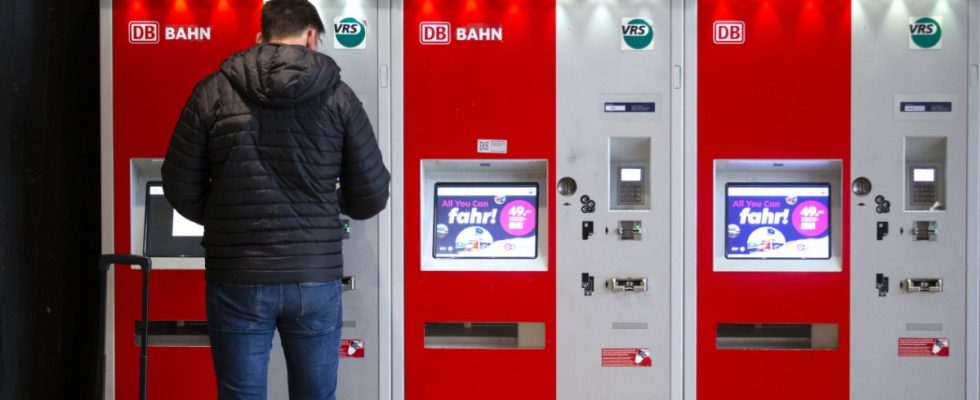Deutsche Bahn passengers will have to pay more for some long-distance tickets from December. The Bahncard 25 is also becoming more expensive, as the federally owned company announced on Tuesday. There will be no change to the saver and super saver prices, but the city ticket will change. An overview:
Flex prices: The so-called flex tickets cost an average of 4.9 percent more from December 10th. The tickets are called that because they are intended to give passengers a certain degree of flexibility, especially when choosing trains. With the tickets you can take any long-distance train on the respective connection on the day. Cancellations are also possible over a longer period of time.
Bahncard 25: The price for the Bahncard 25 increases by three euros when the timetable changes and then costs 62.90 euros annually. With it, owners receive a 25 percent discount on every train journey they book. The price for the Bahncard 50with which single tickets cost half as much, remains the same.
Saver and super saver prices: The so-called savings and super savings offers remain unchanged. The railway offers a certain contingent of these per trip. They are significantly cheaper than flex tickets, but passengers with them are usually restricted to a specific train. In addition, cancellations are only possible within a short period of time. When the timetable changes, the starting prices will continue to be 17.90 euros for the super saver tickets and 21.90 euros for the saver tickets. There will be a permanent savings and super savings offer for seniors, each of which is two euros cheaper. According to Deutsche Bahn, eight out of ten single tickets booked are now purchased at saver or super saver prices.
City ticket: With the Cityticket, passengers can use local transport at their start or destination as part of their long-distance transport ticket. Previously, this option was available for flex and saver price offers. In the future it will only be included with Flextickets.
Timetable change: The new prices apply to the timetable change on December 10th. Up to and including December 9th, all trips can still be booked at the old prices. This also applies to the new timetable, which can be booked from this Wednesday. Tickets for trains around Christmas will remain the same price until then.
It will be difficult for passengers to really understand the price increases in the future. Depending on demand and booking period, the prices for individual train tickets vary considerably. “The prices remain unchanged, but we don’t know when they will be offered,” says the honorary chairman of the Pro Bahn passenger association, Karl-Peter Naumann, about the savings and super savings offers, which should not increase with the timetable change. With the different prices, the railway wants to control demand and better distribute utilization. Full trains on Friday evenings are significantly more expensive than on Tuesday afternoons, when there is hardly anyone on the road. “In the end, the passengers also benefit from this,” says Naumann.
New trains, more offerings
But prices aren’t the only thing that changes when the timetable changes. The group is increasing its long-distance transport offerings, particularly on the routes between Berlin and North Rhine-Westphalia and between Berlin and Munich. The disruption-prone train splitting in Hamm, North Rhine-Westphalia, only occurs half as often as before. The ICE fleet is constantly being expanded to include new ICE 4 and ICE 3 Neo.
From December, the Austrian Federal Railways (ÖBB) will also be operating a night train connection between Berlin and Paris and between Berlin and Brussels.
Rising operating costs and high collective bargaining agreements
When the timetable changed in December 2022, the railway had already passed on some of the significantly increased costs for energy, for example, to customers. At that time, the Flex price even rose by 6.9 percent. This year, the company also has to negotiate a high collective bargaining agreement with the Railway and Transport Union (EVG). However, the price adjustments for customers were “significantly below the current inflation rate,” it said.

